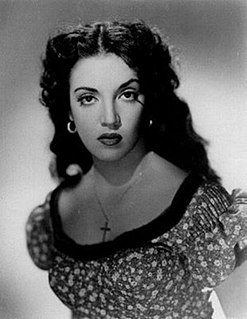
María Cristina Estela Marcela Jurado García, known professionally as Katy Jurado, was a Mexican actress. Jurado began her acting career in Mexico during the Golden Age of Mexican cinema. In 1951, she was recruited by American filmmakers in Mexico and began her Hollywood career during the Golden Age of Hollywood. She acted in popular Western films of the 1950s and 1960s. Her talent for playing a variety of characters helped pave the way for Mexican actresses in American cinema. She was the first Latin American actress nominated for an Oscar, as Best Supporting Actress for her work in Broken Lance (1954), and was the first to win a Golden Globe Award, for her performance in High Noon (1952).

Mexican cinema dates to the late nineteenth century during the rule of President Porfirio Díaz. Seeing a demonstration of short films in 1896, Díaz immediately saw the importance of documenting his presidency in order to present an ideal image of it. With the outbreak of the Mexican Revolution in 1910, Mexican and foreign makers of silent films seized the opportunity to document its leaders and events. From 1915 onward, Mexican cinema focused on narrative film.
Return to sender may refer to:

Angélica Espinoza Stransky, known as Angélica Aragón, is a Mexican film, television and stage actress and singer. She is daughter of the Mexican composer José Ángel Espinoza "Ferrusquilla". She is recognized for her performances in various Mexican film productions such as Cilantro y perejil (1997), Sexo, pudor y lágrimas (1999) and El crimen del Padre Amaro (2002) and in diverse American productions like A Walk in the Clouds (1995) and Dirty Dancing: Havana Nights (2002) among others. She is also famous for having starred in two famous Mexican telenovelas: Vivir un poco (1985) and Mirada de mujer (1997).
Digna... hasta el último aliento is a Mexican film released in 2003.

Federico Luppi was an Argentine-Spanish film, TV, radio and theatre actor. He won numerous awards throughout his acting career, including a Concha de Plata at the San Sebastian International Film Festival.

Bruno Bichir Nájera is a Mexican actor and one of the members of the Bichir family.

Midaq Alley is a 1995 Mexican film adapted from the novel by Egyptian writer Naguib Mahfouz, written by Vicente Leñero and directed by Jorge Fons. The film deals with complex issues such as gay and lesbian related topics, the lower-middle class of Mexico City, and the lives of many people.

Luis Felipe Tovar is a Mexican performance teacher and actor.
María Elena Enríquez Ruiz, known as Helena Rojo, is a Mexican actress and model.
The Golden Ariel is an award that “symbolizes the work of excellence that a member of the film industry has achieved throughout their career and that has contributed to the development and growth of Mexican cinematography”. The Golden Ariel is the highest award given to an individual or institution in the Mexican film industry by the Mexican Academy of Cinematographic Arts and Sciences. It has been awarded annually since 1946 as part of the Ariel Awards and is also given to films that win Best Picture. As of 2020 ceremony, the current recipients are composer Lucía Álvarez and actress María Rojo.

José Tenoch Huerta Mejía is a Mexican actor. He has appeared in a number of movies in Latin America and Spain, starring in both feature films and short films. He is one of the actors featured in Mónica Maristain's book 30 Actors Made in Mexico. He will also be playing Namor in 2022's Black Panther: Wakanda Forever set in the Marvel Cinematic Universe.

Meche Barba, was an American-born Mexican film actress and dancer of the Golden age of Mexican cinema in the 1940s and 1950s. She was considered one of the icons of the "Rumberas film".

María Fernanda García is a Mexican actress best known as "Licha" in Una familia de diez. She has also appeared in many telenovelas and won a Silver Ariel for "Best Actress in a Minor Role" for the film Bienvenido — Welcome (1995) at the 37th Ariel Awards.

Fanny Schiller Hernández was a Mexican award-winning character actress and television star, who also acted in operettas and musicals, during the Golden Age of Mexican cinema. She won two Ariel Awards for best supporting actress, and was nominated for two additional films. She was a social activist, creating the Actor's Union and inspiring the creation of “Rosa Mexicano”. She was accomplished at dubbing and was the voice of many animated characters as well as the official voice of several other notable Mexican actresses.

Leonor Llausás Tostado was a Mexican television and film actress who appeared in over 100 works of film and television. She was nominated multiple times for the Ariel Awards and won a Best Actress award in 1955 from the film Los Fernandez we peralvillo, in 1975 won Diosa de Plata for Las poquianchis. She also was awarded the "Virginia Fabregas" medal of honor by the Mexican National Association of Actors.
The Ariel Award for Best Director is an award presented by the Academia Mexicana de Artes y Ciencias Cinematográficas (AMACC) in Mexico. It is given in honor of a film director who has exhibited outstanding directing while working in the Mexican film industry. In 1947, the 1st and 2nd Ariel Awards were held, with Roberto Gavaldón and Emilio "El Indio" Fernández winning for the films La Barraca and Enamorada, respectively. With the exception of the years 1959 to 1971, when the Ariel Awards were suspended, the award has been given annually. Nominees and winners are determined by a committee formed every year consisting of academy members, previous winners and individuals with at least two Ariel nominations; the committee members submit their votes through the official AMACC website.

Rita Macedo was a Mexican actress and dressmaker. She was nominated for an Ariel Award for her 1956 performance in "Ensayo de un crimen" and in 1991 for a TVyNovelas Prize for "Alcanzar una estrella". She won the Best Actress Ariel Award in 1972 for "Tú, yo, y nosotros". She was married to a pioneer of Mexican radio, television and film, Luis de Llano Palmer, by whom she had two children, Julissa, an actress and musician, and Luis de Llano Macedo, renowned telenovela producer. She also was instrumental in bringing many works of international writers to the Mexican stage.
The Ariel Award for Best Supporting Actor is an award presented by the Academia Mexicana de Artes y Ciencias Cinematográficas (AMACC) in Mexico. It is given in honor of an actor who has delivered an outstanding performance in a supporting role while working within the Mexican film industry. In 1947, the 1st and 2nd Ariel Awards were held, with José Baviera and Fernando Soto winning for the films La Barraca and Campeón Sin Corona, respectively. With the exception of the years 1958 to 1971, when the Ariel Awards were suspended, the award has been given annually. Nominees and winners are determined by a committee formed every year consisting of academy members, previous winners and individuals with at least two Ariel nominations; the committee submit their votes through the official AMACC website.
The 38th Ariel Awards ceremony, organized by the Mexican Academy of Film Arts and Sciences (AMACC) took place on July 22, 1996, in Mexico City. During the ceremony, AMACC presented the Ariel Award in 25 categories honoring films released in 1995. Sin Remitente received four awards out of 14 nominations, including Best Picture and Best Director for Carlos Carrera. La Reina de la Noche was the most awarded film with six awards; La Línea Paterna and Sobrenatural with three; Dulces Compañías, El Anzuelo and Mujeres Insumisas with two; and Entre Pancho Villa y Una Mujer Desnuda, Domingo Siete, De Tripas, Corazón, and El Abuelo Cheno y Otras Historias with one.












